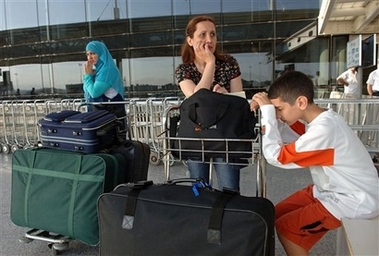 DAY 2: By SAM F. GHATTAS (AP), Israel has hit hundreds of targets in Lebanon as part of its effort to force the release of two soldiers captured by Hezbollah guerrillas, a top Israeli general said Thursday.
DAY 2: By SAM F. GHATTAS (AP), Israel has hit hundreds of targets in Lebanon as part of its effort to force the release of two soldiers captured by Hezbollah guerrillas, a top Israeli general said Thursday.
Israel intensified its attacks against Lebanon on Thursday, blasting Beirut’s airport and two Lebanese army air bases near the Syrian border, and imposing a naval blockade. More than 50 people have died in violence following the capture of two Israeli soldiers by Hezbollah militants.Warplanes punched holes in the runways of Beirut’s international airport and two military air bases, attacks that could draw the Lebanese army into the conflict.Israel has information that Lebanese guerrillas who captured two Israeli soldiers are trying to transfer them to Iran, the Foreign Ministry spokesman said. Spokesman Mark Regev did not disclose the source of his information.
Speaking to reporters, Maj. Gen. Udi Adam, the chief of Israel’s northern command, said Israel was targeting infrastructure in Lebanon that held rockets and other arsenals belong to Hezbollah.Hezbollah guerrillas launched more than 80 rockets and mortars into Israel on Thursday."I imagine over time that we will be able to rid ourselves of this threat entirely," he said.He also said the army was not ruling out sending ground troops into Lebanon.
Israel’s army chief Brig. Gen. Dan Halutz warned that "nothing is safe" in Lebanon and said Beirut itself
to read the continuation of the article it is at the end of the page
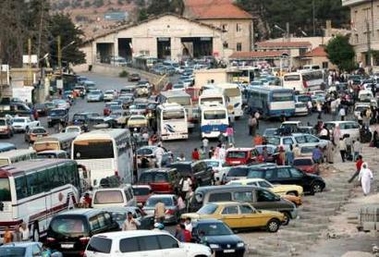 Arab tourists flee Beirut in their vehicles through the country’s eastern border post with Syria as the armed conflict between Israel and Lebanon‘s Hizbollah guerrilla group escalates July 13, 2006. Israel struck Beirut airport and Hizbollah’s television station on Thursday and killed 22 civilians in raids on south Lebanon, intensifying its reprisals after Hizbollah captured two Israeli soldiers and killed eight. REUTERS/Adnan Hajj (LEBANON)
Arab tourists flee Beirut in their vehicles through the country’s eastern border post with Syria as the armed conflict between Israel and Lebanon‘s Hizbollah guerrilla group escalates July 13, 2006. Israel struck Beirut airport and Hizbollah’s television station on Thursday and killed 22 civilians in raids on south Lebanon, intensifying its reprisals after Hizbollah captured two Israeli soldiers and killed eight. REUTERS/Adnan Hajj (LEBANON)
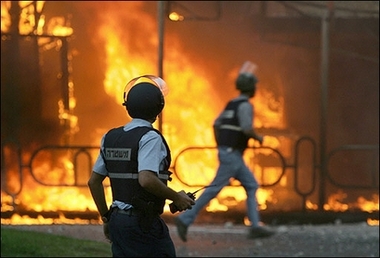 Israeli police officers run as a building burns after a Katyusha-style rocket slammed into the building in the northern coastal town of Nahariya, fired from across the Israeli-Lebanese border. Israeli jets pounded Lebanon in retaliation for the capture and killing of soldiers by Hezbollah, leaving 46 civilians dead and prompting the first ever rocket attack on the city of Haifa.(AFP/Yoav Lemmer)
Israeli police officers run as a building burns after a Katyusha-style rocket slammed into the building in the northern coastal town of Nahariya, fired from across the Israeli-Lebanese border. Israeli jets pounded Lebanon in retaliation for the capture and killing of soldiers by Hezbollah, leaving 46 civilians dead and prompting the first ever rocket attack on the city of Haifa.(AFP/Yoav Lemmer)
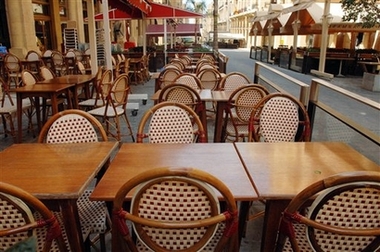 Sidewalk cafes lay empty in downtown Beirut, Lebanon, Thursday, July 13, 2006. Israeli forces intensified their attacks in Lebanon on Thursday, imposing a naval blockade on the country and pounding its only international airport station in Israel’s heaviest air campaign against Lebanon for 24 years. (AP Photo/Mahmoud Tawil)
Sidewalk cafes lay empty in downtown Beirut, Lebanon, Thursday, July 13, 2006. Israeli forces intensified their attacks in Lebanon on Thursday, imposing a naval blockade on the country and pounding its only international airport station in Israel’s heaviest air campaign against Lebanon for 24 years. (AP Photo/Mahmoud Tawil)
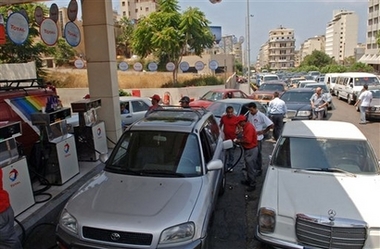 Lebanese citizens line to fill up their vehicles in Beirut, Lebanon, Thursday, July 13, 2006. IsraelI forces intensified their attacks in Lebanon on Thursday, imposing a naval blockade on the country and pounding its only international airport station in Israel’s heaviest air campaign against Lebanon for 24 years. (AP Photo/Mahmoud Tawil)
Lebanese citizens line to fill up their vehicles in Beirut, Lebanon, Thursday, July 13, 2006. IsraelI forces intensified their attacks in Lebanon on Thursday, imposing a naval blockade on the country and pounding its only international airport station in Israel’s heaviest air campaign against Lebanon for 24 years. (AP Photo/Mahmoud Tawil)
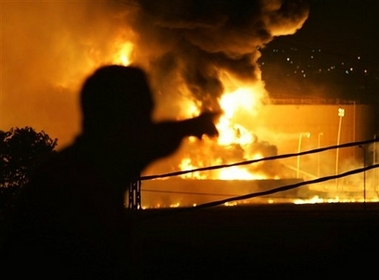 Fuel storage tanks are seen set ablaze after Israeli helicopter gunships unleashed missiles at Rafik Hariri International Airport, in Beirut, Lebanon, late Thursday, July 13, 2006. One Israeli helicopter gunship raked the fuel depots with machine gun fire while three others fired air-to-surface missiles. Officials said about a dozen projectiles struck the tanks on the eastern edge of the airport premises, and that several others missed. (AP Photo/Hussein Malla)
Fuel storage tanks are seen set ablaze after Israeli helicopter gunships unleashed missiles at Rafik Hariri International Airport, in Beirut, Lebanon, late Thursday, July 13, 2006. One Israeli helicopter gunship raked the fuel depots with machine gun fire while three others fired air-to-surface missiles. Officials said about a dozen projectiles struck the tanks on the eastern edge of the airport premises, and that several others missed. (AP Photo/Hussein Malla)
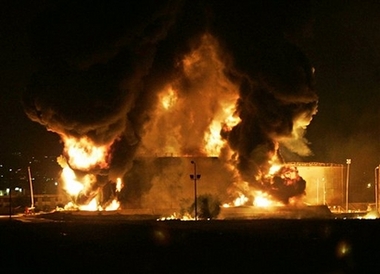 A Lebanese civilian points to the fuel storage tanks set ablaze after Israeli helicopter gunships unleashed missiles at Rafik Hariri International Airport, in Beirut, Lebanon, late Thursday, July 13, 2006. One Israeli helicopter gunship raked the fuel depots with machine gun fire while three others fired air-to-surface missiles. Officials said about a dozen projectiles struck the tanks on the eastern edge of the airport premises, and that several others missed. (AP Photo/Hussein Malla)
A Lebanese civilian points to the fuel storage tanks set ablaze after Israeli helicopter gunships unleashed missiles at Rafik Hariri International Airport, in Beirut, Lebanon, late Thursday, July 13, 2006. One Israeli helicopter gunship raked the fuel depots with machine gun fire while three others fired air-to-surface missiles. Officials said about a dozen projectiles struck the tanks on the eastern edge of the airport premises, and that several others missed. (AP Photo/Hussein Malla)
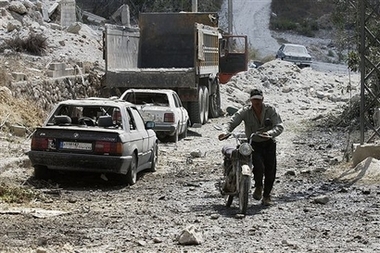 A man pushes his motorcycle through debris and past damaged vehicles after Israeli warplanes targeted the village of Bazuriyeh, in the southern town of Tyre, Lebanon, Thursday, July 13, 2006. Israeli forces intensified their attacks in Lebanon on Thursday, imposing a naval blockade on the country and pounding its only international airport and the Hezbollah TV station in Israel ‘s heaviest air campaign against Lebanon for 24 years. (AP Photo/Mohammed Zaatari)
A man pushes his motorcycle through debris and past damaged vehicles after Israeli warplanes targeted the village of Bazuriyeh, in the southern town of Tyre, Lebanon, Thursday, July 13, 2006. Israeli forces intensified their attacks in Lebanon on Thursday, imposing a naval blockade on the country and pounding its only international airport and the Hezbollah TV station in Israel ‘s heaviest air campaign against Lebanon for 24 years. (AP Photo/Mohammed Zaatari)
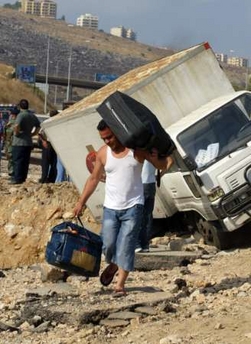 A Lebanese man, carrying his belongings, crosses the Damour Bridge that was attacked by Isreali warplanes in south Lebanon July 13, 2006. Israel struck Beirut airport and Hizbollah’s television station on Thursday and killed 22 civilians in raids on south Lebanon, intensifying its reprisals after Hizbollah captured two Israeli soldiers and killed eight. REUTERS/Sharif Karim (LEBANON)
A Lebanese man, carrying his belongings, crosses the Damour Bridge that was attacked by Isreali warplanes in south Lebanon July 13, 2006. Israel struck Beirut airport and Hizbollah’s television station on Thursday and killed 22 civilians in raids on south Lebanon, intensifying its reprisals after Hizbollah captured two Israeli soldiers and killed eight. REUTERS/Sharif Karim (LEBANON)
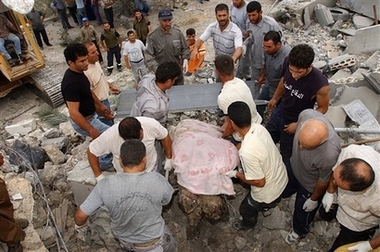 Lebanese citizens carry away the mutilated body of a victim, they found under debris, after Israeli warplanes targeted a house in the village of Zebqin, in the southern town of Tyre, Lebanon, Thursday, July 13, 2006. Israeli forces intensified their attacks in Lebanon on Thursday, imposing a naval blockade on the country and pounding its only international airport and the Hezbollah TV station in Israel ‘s heaviest air campaign against Lebanon for 24 years. (AP Photo/Mohammed Zaatari)
Lebanese citizens carry away the mutilated body of a victim, they found under debris, after Israeli warplanes targeted a house in the village of Zebqin, in the southern town of Tyre, Lebanon, Thursday, July 13, 2006. Israeli forces intensified their attacks in Lebanon on Thursday, imposing a naval blockade on the country and pounding its only international airport and the Hezbollah TV station in Israel ‘s heaviest air campaign against Lebanon for 24 years. (AP Photo/Mohammed Zaatari)
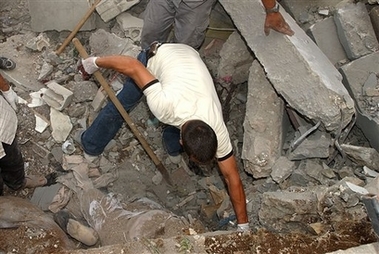 A Lebanese citizen clears debris to release the body of a victim buried under rubble after Israeli warplanes targeted a house in the village of Zebqin, in the southern town of Tyre, Lebanon, Thursday, July 13, 2006. Israeli forces intensified their attacks in Lebanon on Thursday, imposing a naval blockade on the country and pounding its only international airport and the Hezbollah TV station in Israel’s heaviest air campaign against Lebanon for 24 years. (AP Photo/Mohammed Zaatari)
A Lebanese citizen clears debris to release the body of a victim buried under rubble after Israeli warplanes targeted a house in the village of Zebqin, in the southern town of Tyre, Lebanon, Thursday, July 13, 2006. Israeli forces intensified their attacks in Lebanon on Thursday, imposing a naval blockade on the country and pounding its only international airport and the Hezbollah TV station in Israel’s heaviest air campaign against Lebanon for 24 years. (AP Photo/Mohammed Zaatari)
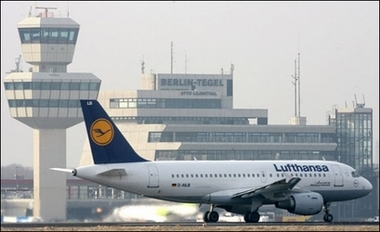 A Lufthansa Airbus is seen in Berlin’s Tegel airport in March 2006. German flag carrier Lufthansa has said that it was cancelling all flights to Beirut between now and Sunday in view of the current violence between Israel and Lebanon.(AFP/File/John Macdougall)
A Lufthansa Airbus is seen in Berlin’s Tegel airport in March 2006. German flag carrier Lufthansa has said that it was cancelling all flights to Beirut between now and Sunday in view of the current violence between Israel and Lebanon.(AFP/File/John Macdougall)
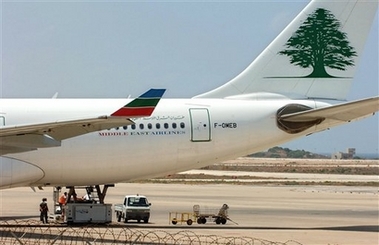 Lebanese airport workers inspect an Middle East Airlines plane for damage next to a runway after Israeli warplanes targeted the Rafik Hariri International Airport, in Beirut, Lebanon, Thursday July 13, 2006. Israeli forces intensified their attacks in Lebanon on Thursday, imposing a naval blockade on the country and pounding its only international airport and the Hezbollah TV station in Israel ‘s heaviest air campaign against Lebanon for 24 years. (AP Photo/ Mahmoud Tawil)
Lebanese airport workers inspect an Middle East Airlines plane for damage next to a runway after Israeli warplanes targeted the Rafik Hariri International Airport, in Beirut, Lebanon, Thursday July 13, 2006. Israeli forces intensified their attacks in Lebanon on Thursday, imposing a naval blockade on the country and pounding its only international airport and the Hezbollah TV station in Israel ‘s heaviest air campaign against Lebanon for 24 years. (AP Photo/ Mahmoud Tawil)
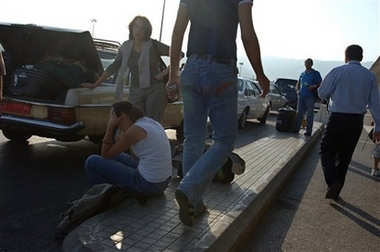 Travelers wait on the sidewalk after they were stranded in Rafik Hariri International Airport, in Beirut, Lebanon, Thursday, July 13, 2006, when Israeli warplanes targeted it. Israeli forces intensified their attacks in Lebanon on Thursday, imposing a naval blockade on the country and pounding its only international airport and the Hezbollah TV station in Israel ‘s heaviest air campaign against Lebanon for 24 years. (AP Photo/Mahmoud Tawil)
Travelers wait on the sidewalk after they were stranded in Rafik Hariri International Airport, in Beirut, Lebanon, Thursday, July 13, 2006, when Israeli warplanes targeted it. Israeli forces intensified their attacks in Lebanon on Thursday, imposing a naval blockade on the country and pounding its only international airport and the Hezbollah TV station in Israel ‘s heaviest air campaign against Lebanon for 24 years. (AP Photo/Mahmoud Tawil)
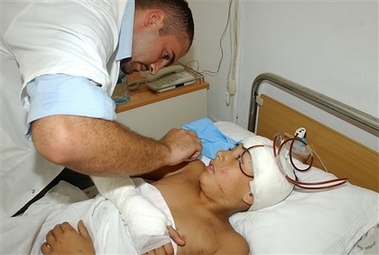 Lebanese Ahmad Khashab receives medical treatment at a hospital in the southern town of Tyre, Lebanon, Thursday, July 13, 2006 after Israeli warplanes targeted his town. Israeli forces intensified their attacks in Lebanon on Thursday, imposing a naval blockade on the country and pounding its only international airport and the Hezbollah TV station in Israel ‘s heaviest air campaign against Lebanon for 24 years. (AP Photo/Mohammed Zaatari)
Lebanese Ahmad Khashab receives medical treatment at a hospital in the southern town of Tyre, Lebanon, Thursday, July 13, 2006 after Israeli warplanes targeted his town. Israeli forces intensified their attacks in Lebanon on Thursday, imposing a naval blockade on the country and pounding its only international airport and the Hezbollah TV station in Israel ‘s heaviest air campaign against Lebanon for 24 years. (AP Photo/Mohammed Zaatari)
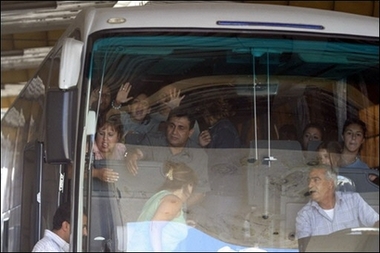 A bus loads u passengers fleeing Lebanon, as they crossed the Syrian border at Jedeidet Yabus. Two Kuwaiti citizens and their Asian domestic helper have been killed in Israel ‘s air bombardments on southern Lebanon.(AFP/Louai Beshara)
A bus loads u passengers fleeing Lebanon, as they crossed the Syrian border at Jedeidet Yabus. Two Kuwaiti citizens and their Asian domestic helper have been killed in Israel ‘s air bombardments on southern Lebanon.(AFP/Louai Beshara)
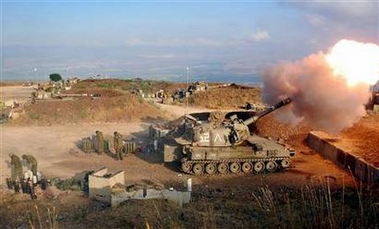 An Israeli army 155 mm mobile artillery piece fires into southern Lebanon from a position on the frontier in Zaura July 13, 2006. REUTERS/Yonathan Weitzman
An Israeli army 155 mm mobile artillery piece fires into southern Lebanon from a position on the frontier in Zaura July 13, 2006. REUTERS/Yonathan Weitzman
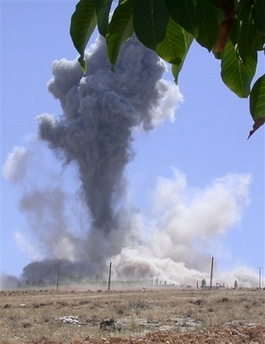 A pall of smoke billows after Israeli airplanes targeted a transmission antenna for the Hezbollah’s Al-Manar TV, near the town of Baalbek, in the Bekaa Valley, eastern Lebanon, Thursday, July 13, 2006. Israeli forces intensified their attacks in Lebanon on Thursday, imposing a naval blockade on the country and pounding its only international airport and the Hezbollah TV station. (AP Photo/Samer Husseini)
A pall of smoke billows after Israeli airplanes targeted a transmission antenna for the Hezbollah’s Al-Manar TV, near the town of Baalbek, in the Bekaa Valley, eastern Lebanon, Thursday, July 13, 2006. Israeli forces intensified their attacks in Lebanon on Thursday, imposing a naval blockade on the country and pounding its only international airport and the Hezbollah TV station. (AP Photo/Samer Husseini)
 Israeli’s examine the scene of a rocket attack by Hezbollah guerrillas in the northern Israeli town of Safed, Thursday, July 13, 2006. A barrage of seven rockets were fired at the town by the resistence in southern Lebanon, injuring nine people, two seriously, Israeli military sources said. (AP Photo/Oded Balilty)
Israeli’s examine the scene of a rocket attack by Hezbollah guerrillas in the northern Israeli town of Safed, Thursday, July 13, 2006. A barrage of seven rockets were fired at the town by the resistence in southern Lebanon, injuring nine people, two seriously, Israeli military sources said. (AP Photo/Oded Balilty)
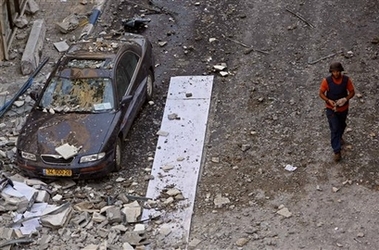 An Israeli police officer examines the scene of a rocket attack by Hezbollah guerrillas in the northern Israeli town of Safed, Thursday, July 13, 2006. A barrage of seven rockets were fired at the town by the resistence in southern Lebanon, injuring nine people, two seriously, Israeli military sources said. (AP Photo/Oded Balilty)
An Israeli police officer examines the scene of a rocket attack by Hezbollah guerrillas in the northern Israeli town of Safed, Thursday, July 13, 2006. A barrage of seven rockets were fired at the town by the resistence in southern Lebanon, injuring nine people, two seriously, Israeli military sources said. (AP Photo/Oded Balilty)
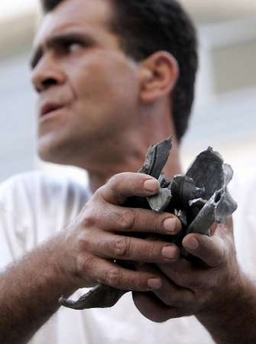 An Israeli man holds up Katyusha-style rocket parts, following an attack in the northern Israeli town of Safed, July 13, 2006. Hizbollah fighters from Lebanon fired barrages of rockets into nearly 20 towns across northern Israel on Thursday, killing one civilian and wounding 42 others in their heaviest bombardment in a decade. REUTERS/Yonathan Weitzman (ISRAEL)
An Israeli man holds up Katyusha-style rocket parts, following an attack in the northern Israeli town of Safed, July 13, 2006. Hizbollah fighters from Lebanon fired barrages of rockets into nearly 20 towns across northern Israel on Thursday, killing one civilian and wounding 42 others in their heaviest bombardment in a decade. REUTERS/Yonathan Weitzman (ISRAEL)
 Travelers wait on the sidewalk after they were stranded at Rafik Hariri International Airport, in Beirut, Lebanon, Thursday, July 13, 2006, after Israeli warplanes targeted it. Israeli forces intensified their attacks in Lebanon on Thursday, imposing a naval blockade on the country and pounding its only international airport and the Hezbollah TV station in Israel ‘s heaviest air campaign against Lebanon for 24 years. (AP Photo/Mahmoud Tawil)
Travelers wait on the sidewalk after they were stranded at Rafik Hariri International Airport, in Beirut, Lebanon, Thursday, July 13, 2006, after Israeli warplanes targeted it. Israeli forces intensified their attacks in Lebanon on Thursday, imposing a naval blockade on the country and pounding its only international airport and the Hezbollah TV station in Israel ‘s heaviest air campaign against Lebanon for 24 years. (AP Photo/Mahmoud Tawil)
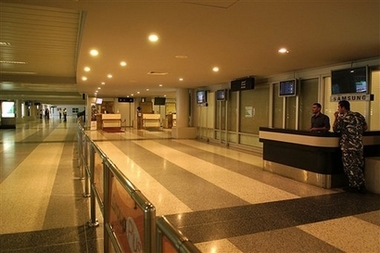 Lebanese policemen and citizens stand in the empty Rafik Hariri International Airport, in Beirut, Lebanon, Thursday, July 13, 2006, after Israeli warplanes targeted it. Israeli forces intensified their attacks in Lebanon on Thursday, imposing a naval blockade on the country and pounding its only international airport and the Hezbollah TV station in Israel ‘s heaviest air campaign against Lebanon for 24 years. (AP Photo/ Jean Haddad)
Lebanese policemen and citizens stand in the empty Rafik Hariri International Airport, in Beirut, Lebanon, Thursday, July 13, 2006, after Israeli warplanes targeted it. Israeli forces intensified their attacks in Lebanon on Thursday, imposing a naval blockade on the country and pounding its only international airport and the Hezbollah TV station in Israel ‘s heaviest air campaign against Lebanon for 24 years. (AP Photo/ Jean Haddad)
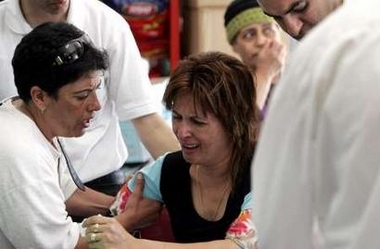 A wounded Israeli woman is taken to an ambulance, following a Katyusha-style rocket attack in the northern Israeli town of Safed, July 13, 2006. Hizbollah fighters from Lebanon fired barrages of rockets into nearly 20 towns across northern Israel on Thursday, killing one civilian and wounding 42 others in their heaviest bombardment in a decade. REUTERS/Yonathan Weitzman (ISRAEL)
A wounded Israeli woman is taken to an ambulance, following a Katyusha-style rocket attack in the northern Israeli town of Safed, July 13, 2006. Hizbollah fighters from Lebanon fired barrages of rockets into nearly 20 towns across northern Israel on Thursday, killing one civilian and wounding 42 others in their heaviest bombardment in a decade. REUTERS/Yonathan Weitzman (ISRAEL)
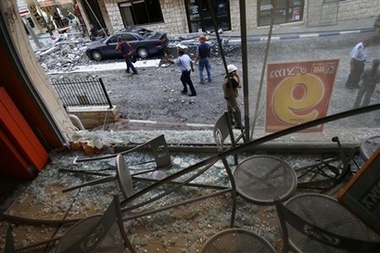 Israelis examine the scene of a rocket attack by Hezbollah guerillas on the northern Israeli town of Safed, Thursday, July 13, 2006. A barrage of seven rockets were fired at the town by the resistence in southern Lebanon, injuring nine people, two seriously, Israeli military sources said. (AP Photo/Oded Balilty)
Israelis examine the scene of a rocket attack by Hezbollah guerillas on the northern Israeli town of Safed, Thursday, July 13, 2006. A barrage of seven rockets were fired at the town by the resistence in southern Lebanon, injuring nine people, two seriously, Israeli military sources said. (AP Photo/Oded Balilty)
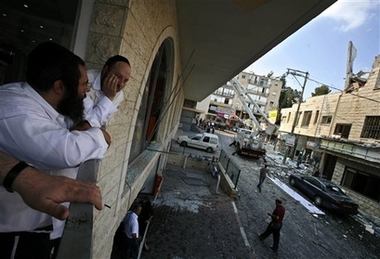 Israelis examine the scene of a rocket attack by Lebanese guerrillas in the northern Israeli town of Safed, Thursday, July 13, 2006. A barrage of seven rockets were fired at the town by the resistence in southern Lebanon, injuring nine people, two seriously, Israeli military sources said. (AP Photo/Oded Balilty)
Israelis examine the scene of a rocket attack by Lebanese guerrillas in the northern Israeli town of Safed, Thursday, July 13, 2006. A barrage of seven rockets were fired at the town by the resistence in southern Lebanon, injuring nine people, two seriously, Israeli military sources said. (AP Photo/Oded Balilty)
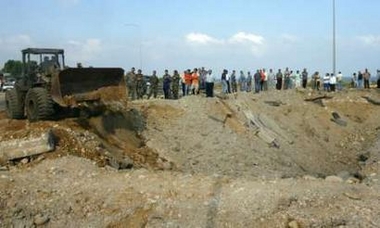 A Lebanese army bulldozer fills up a hole in the ground following Israeli air strikes along a road connecting Saida to Beirut in Damour, south Beirut July 13, 2006. Israeli aircraft attacked Beirut airport and killed 22 civilians in strikes on south Lebanon on Thursday, dramatically widening its reprisals after Hizbollah captured two Israeli soldiers and killed eight. REUTERS/Sharif Karim (LEBANON)
A Lebanese army bulldozer fills up a hole in the ground following Israeli air strikes along a road connecting Saida to Beirut in Damour, south Beirut July 13, 2006. Israeli aircraft attacked Beirut airport and killed 22 civilians in strikes on south Lebanon on Thursday, dramatically widening its reprisals after Hizbollah captured two Israeli soldiers and killed eight. REUTERS/Sharif Karim (LEBANON)
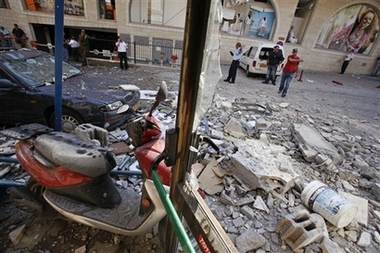 Israeli police and rescue workers examine the scene of a rocket attack by Hezbollahfighters on the northern Israeli town of Safed, Thursday, July 13, 2006. A barrage of seven rockets were fired at the town by guerillas in southern Lebanon, injuring nine people, two seriously, Israeli military sources said. (AP Photo/Oded Balilty)
Israeli police and rescue workers examine the scene of a rocket attack by Hezbollahfighters on the northern Israeli town of Safed, Thursday, July 13, 2006. A barrage of seven rockets were fired at the town by guerillas in southern Lebanon, injuring nine people, two seriously, Israeli military sources said. (AP Photo/Oded Balilty)
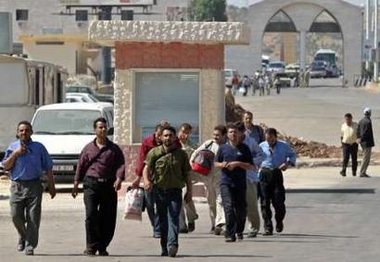 Syrian workers fleeing from Lebanon pass through the Syrian border post of Jdeideh July 13, 2006. Hordes of tourists poured into Syria from Lebanon on Thursday, fleeing Israeli bombing that turned Syria into Lebanon‘s only outlet to the world. REUTERS/Khaled al-Hariri (SYRIA)
Syrian workers fleeing from Lebanon pass through the Syrian border post of Jdeideh July 13, 2006. Hordes of tourists poured into Syria from Lebanon on Thursday, fleeing Israeli bombing that turned Syria into Lebanon‘s only outlet to the world. REUTERS/Khaled al-Hariri (SYRIA)
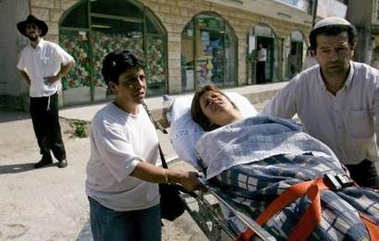 A wounded Israeli woman is taken to an ambulance, following a Katyusha-style rocket attack in the northern Israeli town of Safed, July 13, 2006. Hizbollah fighters from Lebanon fired barrages of rockets into nearly 20 towns across northern Israel on Thursday, killing one civilian and wounding 42 others in their heaviest bombardment in a decade. REUTERS/Yonathan Weitzman (ISRAEL)
A wounded Israeli woman is taken to an ambulance, following a Katyusha-style rocket attack in the northern Israeli town of Safed, July 13, 2006. Hizbollah fighters from Lebanon fired barrages of rockets into nearly 20 towns across northern Israel on Thursday, killing one civilian and wounding 42 others in their heaviest bombardment in a decade. REUTERS/Yonathan Weitzman (ISRAEL) 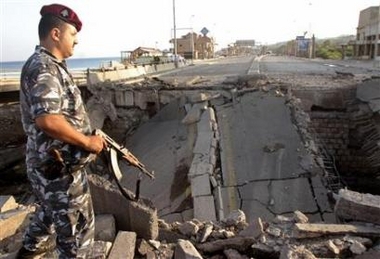 A Lebanese soldier inspects the Al Owali bridge in Saida that was attacked by Israeli warplanes in south Lebanon July 13, 2006. (Ali Hashisho/Reuters)
A Lebanese soldier inspects the Al Owali bridge in Saida that was attacked by Israeli warplanes in south Lebanon July 13, 2006. (Ali Hashisho/Reuters)
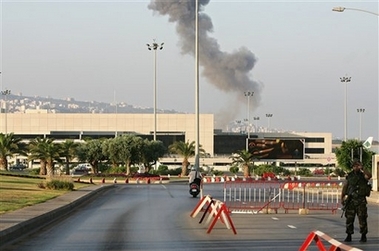 A Lebanese soldier stands guard at a permanent checkpoint as smoke billows above Rafik Hariri International Airport, after Israeli warplanes targeted it in Beirut, Lebanon, Thursday, July 13, 2006. Israeli forces intensified their attacks in Lebanon on Thursday, imposing a naval blockade on the country and pounding its only international airport and the Hezbollah TV station. (AP Photo)
A Lebanese soldier stands guard at a permanent checkpoint as smoke billows above Rafik Hariri International Airport, after Israeli warplanes targeted it in Beirut, Lebanon, Thursday, July 13, 2006. Israeli forces intensified their attacks in Lebanon on Thursday, imposing a naval blockade on the country and pounding its only international airport and the Hezbollah TV station. (AP Photo)
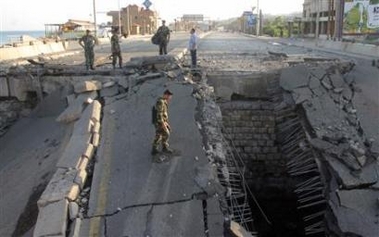 Lebanese army soldiers inspect Al Owali bridge in Saida that was attacked by Israeli warplanes in south Lebanon July 13, 2006. (Ali Hashisho/Reuters)
Lebanese army soldiers inspect Al Owali bridge in Saida that was attacked by Israeli warplanes in south Lebanon July 13, 2006. (Ali Hashisho/Reuters)
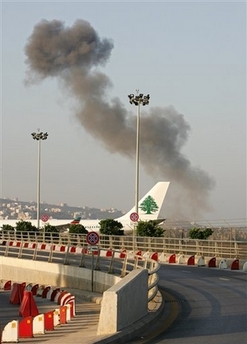 Smoke billows above Rafik Hariri International Airport after Israeli warplanes targeted it, in Beirut, Lebanon, Thursday, July 13, 2006. Israeli forces intensified their attacks in Lebanon on Thursday, imposing a naval blockade on the country and pounding its only international airport and the Hezbollah TV station. (AP Photo)
Smoke billows above Rafik Hariri International Airport after Israeli warplanes targeted it, in Beirut, Lebanon, Thursday, July 13, 2006. Israeli forces intensified their attacks in Lebanon on Thursday, imposing a naval blockade on the country and pounding its only international airport and the Hezbollah TV station. (AP Photo)
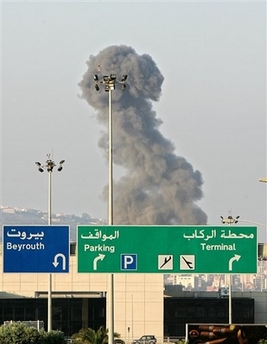
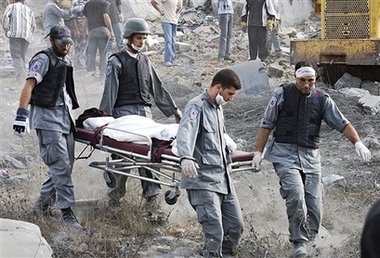 Lebanese medics walk in the rubble as they carry the body of a victim who was killed after Israeli forces targeted a house in the village of Dweir near Nabatiyeh, southern Lebanon, Thursday, July 13, 2006. Israeli forces intensified their attacks in Lebanon Thursday, with airstrikes that blasted the country’s only international airport and the Hezbollah TV station. Among the dead from Israeli attacks in south Lebanon was a family of 10 and another family of seven, killed in their homes in the village of Dweir, the officials said. (AP Photo/Mohammed Zaatari)
Lebanese medics walk in the rubble as they carry the body of a victim who was killed after Israeli forces targeted a house in the village of Dweir near Nabatiyeh, southern Lebanon, Thursday, July 13, 2006. Israeli forces intensified their attacks in Lebanon Thursday, with airstrikes that blasted the country’s only international airport and the Hezbollah TV station. Among the dead from Israeli attacks in south Lebanon was a family of 10 and another family of seven, killed in their homes in the village of Dweir, the officials said. (AP Photo/Mohammed Zaatari)
 A Lebanese citizen inspects the body of a baby who was killed after Israeli forces targeted a house in the village of Dweir near Nabatiyeh, southern Lebanon, Thursday, July 13, 2006. Israeli forces intensified their attacks in Lebanon Thursday, with airstrikes that blasted the country’s only international airport and the Hezbollah TV station. Among the dead from Israeli attacks in south Lebanon was a family of 10 and another family of seven, killed in their homes in the village of Dweir, the officials said. (AP Photo/Samer Wehbi)
A Lebanese citizen inspects the body of a baby who was killed after Israeli forces targeted a house in the village of Dweir near Nabatiyeh, southern Lebanon, Thursday, July 13, 2006. Israeli forces intensified their attacks in Lebanon Thursday, with airstrikes that blasted the country’s only international airport and the Hezbollah TV station. Among the dead from Israeli attacks in south Lebanon was a family of 10 and another family of seven, killed in their homes in the village of Dweir, the officials said. (AP Photo/Samer Wehbi)
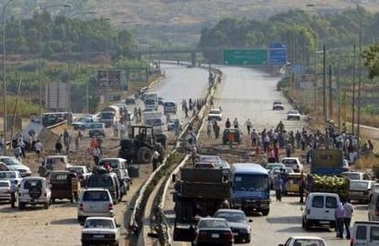 An Lebanese army bulldozer clears the road linking Saida to Beirut that was attacked by Israeli warplanes in Damour, south Beirut, July 13, 2006. Israel struck Beirut airport and Hizbollah’s television station on Thursday and killed 22 civilians in raids on south Lebanon, intensifying its reprisals after Hizbollah captured two Israeli soldiers and killed eight. REUTERS/ SHARIF KARIM (LEBANON)
An Lebanese army bulldozer clears the road linking Saida to Beirut that was attacked by Israeli warplanes in Damour, south Beirut, July 13, 2006. Israel struck Beirut airport and Hizbollah’s television station on Thursday and killed 22 civilians in raids on south Lebanon, intensifying its reprisals after Hizbollah captured two Israeli soldiers and killed eight. REUTERS/ SHARIF KARIM (LEBANON)
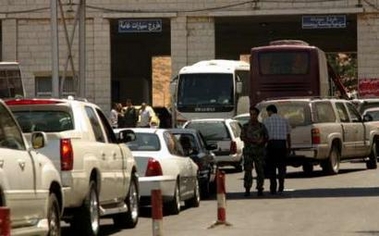 Tourist cars carrying Arabs flee Beirut through the country’s eastern border post with Syria as the armed conflict between Israel and Lebanon‘s Hizbollah guerrilla group escalates July 13, 2006. Israel struck Beirut airport and Hizbollah’s television station on Thursday and killed 22 civilians in raids on south Lebanon, intensifying its reprisals after Hizbollah captured two Israeli soldiers and killed eight. REUTERS/Afif Dyab (LEBANON)
Tourist cars carrying Arabs flee Beirut through the country’s eastern border post with Syria as the armed conflict between Israel and Lebanon‘s Hizbollah guerrilla group escalates July 13, 2006. Israel struck Beirut airport and Hizbollah’s television station on Thursday and killed 22 civilians in raids on south Lebanon, intensifying its reprisals after Hizbollah captured two Israeli soldiers and killed eight. REUTERS/Afif Dyab (LEBANON)
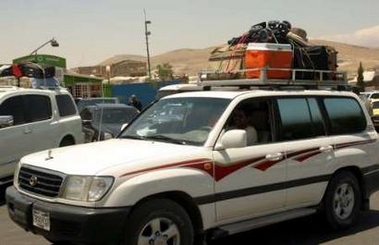 Tourist cars carrying Arabs flee Beirut through the country’s eastern border post with Syria as the armed conflict between Israel and Lebanon‘s Hizbollah guerrilla group escalates July 13, 2006. Israel struck Beirut airport and Hizbollah’s television station on Thursday and killed 22 civilians in raids on south Lebanon, intensifying its reprisals after Hizbollah captured two Israeli soldiers and killed eight. REUTERS/Afif Dyab (LEBANON)
Tourist cars carrying Arabs flee Beirut through the country’s eastern border post with Syria as the armed conflict between Israel and Lebanon‘s Hizbollah guerrilla group escalates July 13, 2006. Israel struck Beirut airport and Hizbollah’s television station on Thursday and killed 22 civilians in raids on south Lebanon, intensifying its reprisals after Hizbollah captured two Israeli soldiers and killed eight. REUTERS/Afif Dyab (LEBANON)
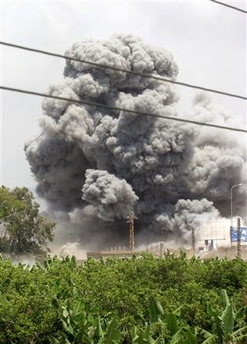 Smoke rises after Israeli jets fired a missile near the entrance of Saida in south Lebanon July 13, 2006. (Ali Hashisho/Reuters)
Smoke rises after Israeli jets fired a missile near the entrance of Saida in south Lebanon July 13, 2006. (Ali Hashisho/Reuters)
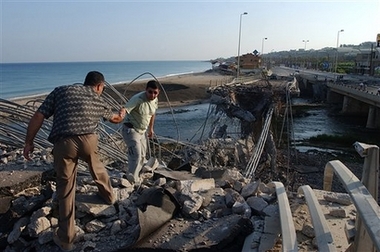 A Lebanese citizen helps another cross a damaged bridge that was destroyed late Wednesday when Israeli fighter jets targeted it, on the Awali River, north of the southern port city of Sidon, Lebanon, Thursday, July 13, 2006. Israeli forces intensified their attacks in Lebanon on Thursday, imposing a naval blockade on the country and pounding its only international airport and the Hezbollah TV station in Israel ‘s heaviest air campaign against Lebanon for 24 years. (AP Photo/Mohammed Zaatari)
A Lebanese citizen helps another cross a damaged bridge that was destroyed late Wednesday when Israeli fighter jets targeted it, on the Awali River, north of the southern port city of Sidon, Lebanon, Thursday, July 13, 2006. Israeli forces intensified their attacks in Lebanon on Thursday, imposing a naval blockade on the country and pounding its only international airport and the Hezbollah TV station in Israel ‘s heaviest air campaign against Lebanon for 24 years. (AP Photo/Mohammed Zaatari)
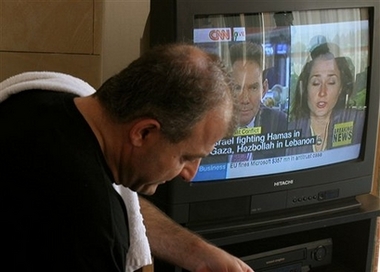 A Lebanese citizen sits in a hotel close to the television as he hears the news from Lebanon in southern city of Larnaca, Cyprus, Thursday, July 13, 2006. Several MEA planes landed overnight at Larnaca international airport after Israeli warplanes targeted the Rafik Hariri International Airport, in Beirut, Lebanon. (AP Photo/Petros Karadjias)
A Lebanese citizen sits in a hotel close to the television as he hears the news from Lebanon in southern city of Larnaca, Cyprus, Thursday, July 13, 2006. Several MEA planes landed overnight at Larnaca international airport after Israeli warplanes targeted the Rafik Hariri International Airport, in Beirut, Lebanon. (AP Photo/Petros Karadjias)
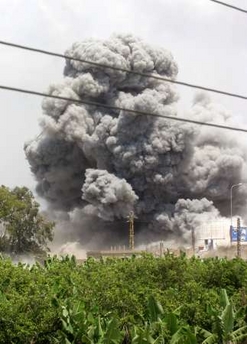 Smoke rises after Israeli jets fired a missile near the entrance of Saida in south Lebanon July 13, 2006. Israel struck Beirut airport and Hizbollah’s television station on Thursday and killed 22 civilians in raids on south Lebanon, intensifying its reprisals after Hizbollah captured two Israeli soldiers and killed eight. REUTERS/ Ali Hashisho (LEBANON)
Smoke rises after Israeli jets fired a missile near the entrance of Saida in south Lebanon July 13, 2006. Israel struck Beirut airport and Hizbollah’s television station on Thursday and killed 22 civilians in raids on south Lebanon, intensifying its reprisals after Hizbollah captured two Israeli soldiers and killed eight. REUTERS/ Ali Hashisho (LEBANON)
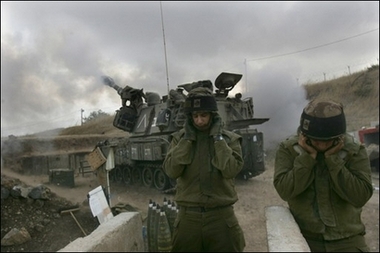 Israeli soldiers close their ears as a mobile artillery unit fires 155mm shell towards Hezbollah targets in southern Lebanon, at a military staging area along the northern Israeli border. The government has urged Israel to keep its military action in Gaza and southern Lebanon "proportionate" as it expressed concern about the worsening crisis in the Middle East.(AFP/Menahem Kahana)
Israeli soldiers close their ears as a mobile artillery unit fires 155mm shell towards Hezbollah targets in southern Lebanon, at a military staging area along the northern Israeli border. The government has urged Israel to keep its military action in Gaza and southern Lebanon "proportionate" as it expressed concern about the worsening crisis in the Middle East.(AFP/Menahem Kahana)
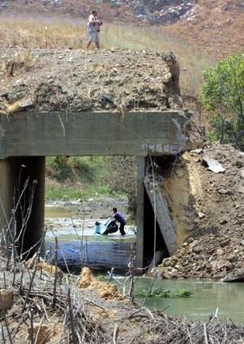 Lebanese civilians inspect Litani bridge that was attacked by Israeli warplanes in south Lebanon July 13, 2006. Israel struck Beirut airport and Hizbollah’s television station on Thursday and killed 22 civilians in raids on south Lebanon, intensifying its reprisals after Hizbollah captured two Israeli soldiers and killed eight. REUTERS/Karamallah Daher (LEBANON)
Lebanese civilians inspect Litani bridge that was attacked by Israeli warplanes in south Lebanon July 13, 2006. Israel struck Beirut airport and Hizbollah’s television station on Thursday and killed 22 civilians in raids on south Lebanon, intensifying its reprisals after Hizbollah captured two Israeli soldiers and killed eight. REUTERS/Karamallah Daher (LEBANON)
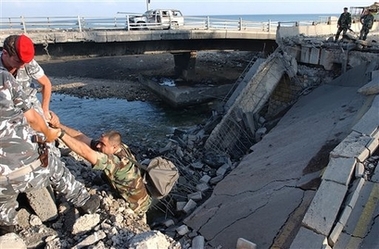 Lebanese policemen help a Lebanese soldier cross a damaged bridge that was destroyed late Wednesday when Israeli fighter jets targeted it, on the Awali River, north of the southern port city of Sidon, Lebanon, Thursday, July 13, 2006. Israeli forces intensified their attacks in Lebanon on Thursday, imposing a naval blockade on the country and pounding its only international airport and the Hezbollah TV station in Israel ‘s heaviest air campaign against Lebanon for 24 years. (AP Photo/Mohammed Zaatari)
Lebanese policemen help a Lebanese soldier cross a damaged bridge that was destroyed late Wednesday when Israeli fighter jets targeted it, on the Awali River, north of the southern port city of Sidon, Lebanon, Thursday, July 13, 2006. Israeli forces intensified their attacks in Lebanon on Thursday, imposing a naval blockade on the country and pounding its only international airport and the Hezbollah TV station in Israel ‘s heaviest air campaign against Lebanon for 24 years. (AP Photo/Mohammed Zaatari)
Two days of Israeli bombings, the heaviest air campaign against its neighbor in 24 years, had killed 47 Lebanese and wounded 103, Health Minister Mohammed Jawad Khalife said. Besides the Israeli civilian, eight Israeli soldiers had also been killed.Both sides played a high stakes game following the capture of the two soldiers by Hezbollah: Israel sought to end Hezbollah’s presence on the border, while the guerrillas insisted on trading the captured soldiers for Arab prisoners.
Trapped between the two sides was Lebanon, which Israel said it held responsible for Hezbollah’s actions. The Lebanese government insisted it had no prior knowledge of the Hezbollah raid and did not condone it. Hezbollah fighters operate with almost total autonomy in southern Lebanon, and the government has no control over their actions. But Lebanon has long resisted international pressure to disarm the group.
The Israeli warnings of more attacks caused panic in Beirut, and many people stayed home from work. Long lines formed at gas stations and supermarkets were packed.The violence reverberated throughout the region and pushed crude oil prices to a new intraday record of $76.30 a barrel.
Western countries, Russia and the UN called for restraint and demanded the return of the soldiers. The Arab League called an emergency meeting of foreign ministers in Cairo on Saturday. The Lebanese Cabinet urged the U.N. security counsil to intervene. The European Union criticized Israel for using what it called "disproportionate" force in its attacks and EU foreign policy chief Javier Solana said he was planning a peace mission. President Bush pledged to work with Israel, criticizing Hezbollah for thwarting efforts for peace in the Middle East.
"My attitude is this: there are a group of terrorists who want to stop the advance of peace," he said at a news conference in Germany. "The soldiers need to be returned." Palestinian President Mahmoud Abbas warned that Israel’s Lebanon offensive "is raising our fears of a new regional war" and urged world powers to intervene.
Middle East satellite TV stations focused on the violence, and one station showed a man holding a baby killed in the Israeli bombings. The eight Israeli soldiers killed so far is the highest death toll for the army in four years. Three soldiers died in the initial Hezbollah raid, and four were killed when their tank struck a land mine Wednesday.
In northern Israel, thousands of civilians spent the night in underground shelters as Hezbollah fired rockets at northern Israel. A 40-year-old Israeli woman was killed and five people were wounded in the rocket attacks, the Israeli army reported. After hitting roads and bridges in the south all day Wednesday, Israel dramatically expanded its campaign Thursday with their biggest offensive in Lebanon since Israel’s 1982 invasion. Israeli warships imposed a naval blockade of Lebanese ports, and the Israeli military said it could also target the Beirut-to-Damascus highway, the main land link between Lebanon and the outside world.
Military jets attacked runways at the Rayak air base in the eastern Bekaa Valley, police said, and at the Qoleiat air base near the Syrian border in the north. Rayak, four miles west of the Syrian border, is home to the country’s main military air base and is military headquarters in eastern Lebanon. Because Lebanon’s army has no operational fixed-wing aircraft and only operates helicopters — which can take off or land anywhere — the attacks appeared to be mostly symbolic.
Israeli Defense Minister Amir Peretz said his forces would not allow Hezbollah guerrillas to occupy positions along the southern Lebanese border. "If the government of Lebanon fails to deploy its forces, as is expected of a sovereign government, we shall not allow Hezbollah forces to remain any further on the borders of the state of Israel," Peretz said.
Air force Maj. Gen. Amir Eshel said the campaign was likely Israel’s largest ever in Lebanon "if you measure it in number of targets hit in one night, the complexity of the strikes." The last major offensive against Lebanon was in 1996 when about 150 Lebanese civilians were killed. Travelers to and from Beirut were stranded all over the region and beyond after the airport strike. Among them was Foreign Minister Fawzi Salloukh, who was returning from a visit to Armenia and — like many — was forced to make his way home through Syria. Israeli warplanes blasted craters into all three runways at the airport, located by the seaside in the Lebanese capital’s Hezbollah-controlled southern suburbs, forcing incoming flights to divert to Cyprus. The main terminal of the $500 million airport remained intact.
The Israeli military said it struck the airport because it is "a central hub for the transfer of weapons and supplies to the Hezbollah terrorist organization." It was the first time since Israel’s 1982 invasion of Lebanon and occupation of Beirut that the airport was hit by Israel. The Israelis in 1968 sent commandos to Beirut airport, blowing up 13 passenger planes in retaliation for Arab militants firing on an Israeli airliner in Athens.
Details from the violence included: • An Israeli missile hit Hezbollah’s Al-Manar TV studios in southern Beirut, station official Ibrahim Farhat said. One person was hurt; broadcasts continued. An Al-Manar transmission antenna hit near Baalbek stopped transmissions in that area. • A civic center attached to a Shiite Muslim mosque near the town of Baalbek was hit. • A Lebanese family of 10 and another family of seven were killed in their homes in the village of Dweir, Lebanese officials said. • Among the dead Lebanese were a soldier and a Hezbollah fighter. • Hezbollah fired rockets at the northern Israeli towns of Safed, Nahariya, Kiryat Shmona, and Carmiel, saying it was using a rocket called "Thunder 1" for the first time. The missiles appeared to be more advanced than the inaccurate Katyusha — the standard Hezbollah rocket. The Israeli army said several rockets had landed more than 12 miles south of the border, showing that Hezbollah has managed to extend its missiles’ range.
New york Times Thursday, July 13 — Israel struck targets in Beirut and south Lebanon today in retaliation for a cross-border assault by the guerilla group Hezbollah, prompting President Bush to express concern that the Israeli actions might “topple’’ the Lebanese government.
Israel, which is already waging a military operation in the Gaza Strip to free a soldier captured by Palestinian militants, said that two of its soldiers were captured and at least eight killed in the fighting with Hezbollah.
The toll was the highest for Israeli soldiers in several years. Combined with the deaths on Wednesday of at least 22 Palestinians, including many civilians, in fighting in Gaza, it was the deadliest day in the Arab-Israeli conflict since Israel withdrew from the Gaza Strip last year. The violence continued into the early morning hours today, when an Israeli air strike heavily damaged the Palestinian Foreign Ministry building in Gaza.
News services reported that Israeli planes dropped leaflets today over the southern suburbs of Beiruit, where Hezbollah is strong, warning residents to evacuate the area. Hezbollah said it would retaliate for any bombing there by firing rockets at the largest city in northern Israel, Haifa.
Even though Israel has overwhelming military superiority in both southern Lebanon and Gaza, the new fighting was a sign that the conflict has blown past the limits of local confrontation and become a regional crisis.
Speaking in Germany today at a news conference with Chancellor Angela Merkel, President Bush said that the United States was “working actively to help calm the situation.’’
Mr. Bush condemned Hezbollah and its capture of the Israeli soldiers, while calling on Israel to show restraint. He said he was worried about the effect on Lebanon’s government, which the United States has strongly supported since Syria was forced to end its occupation of the country last year.
“Our concern is that any activities by Israel to protect herself could weaken that government, could topple the government,’’ he said.
But Mr. Bush also said that “Syria needs to be held to account’’ for its support of Hezbollah and the militant wing of Hamas.
As with the Gaza conflict, Israel ruled out negotiations with the Lebanese captors of the Israeli soldiers. Prime Minister Ehud Olmert said he held the Lebanese government responsible for the assault by Hezbollah, a Shiite Muslim group that participates in Lebanese politics but also continues to battle Israel.
“I want to make clear that the event this morning is not a terror act, but an act of a sovereign state that attacked Israel without reason,” Mr. Olmert said. “The government of Lebanon, of which Hezbollah is a part, is trying to shake the stability of the region.”
Israel is demanding that all three of its soldiers be returned, and that militants stop firing rockets at Israelis from Gaza in the south or Lebanon in the north. But both Hamas and Hezbollah are demanding the release of a large number of Palestinian and other Arab prisoners held by Israel in exchange.
“The prisoners will not be returned except through one way — indirect negotiations and a trade,” said the leader of Hezbollah, Sheik Hassan Nasrallah, speaking to reporters in Beirut on Wednesday.
He suggested the possibility of an overall deal. “The capture of the two soldiers could provide a solution to the Gaza crisis,” he said. The operation had been planned for months, he said, though he added, “The timing, no doubt, provides support for our brothers in Palestine.”
Hezbollah released a statement saying that the two soldiers had been transferred to “a safe place,” but did not give any other details.
Two years ago, Hezbollah managed to push Israel to free more than 400 Palestinian and Lebanese prisoners in exchange for an Israeli businessman held in Lebanon and for the bodies of three Israeli soldiers killed in a Hezbollah attack in 2000. Israel is currently holding close to 9,000 Palestinian prisoners; the number of Lebanese prisoners is believed to be much smaller.
The White House released a statement condemning the Hezbollah raid, calling it an “unprovoked act of terrorism” and holding Syria and Iran responsible because of their longstanding support for the group. The United Nations representative to southern Lebanon, Gier Pedersen, also criticized the Hezbollah raid, calling it “an act of very dangerous proportions.”
The fighting on the Lebanese border erupted around 9 a.m., when Hezbollah attacked several Israeli towns with rocket fire, wounding several civilians, the Israeli military said. But that attack was a diversion for the main operation, several miles to the east, where Hezbollah militants fired antitank missiles at two armored Humvees patrolling the Israeli side of the border fence, the military said. Of the seven soldiers in the two jeeps, three were killed, two wounded and two abducted, the military said.
Israel then responded with artillery fire, airstrikes and a naval bombardment that focused on about 40 sites in southern Lebanon. Most were believed to be Hezbollah strongholds, but roads and bridges were also hit in an attempt to keep Hezbollah from moving the captured soldiers farther north, according to the military. At least 2 Lebanese civilians were killed and more than 10 wounded in southern Lebanon, Lebanese officials said.
Israel also sent ground forces into Lebanon, and a tank hit an explosive planted in the road, killing all four soldiers inside, the Israeli military said. Another soldier was killed while trying to rescue those in the tank.
The Israeli incursion was the first such operation in southern Lebanon since Israel pulled its troops back into Israel in 2000, ending two decades of occupation.
Political and military analysts in Egypt and Israel said the recent events seemed to stem from a growing relationship between Hamas and Hezbollah. While there is no direct evidence of coordinated attacks, several analysts said they believed that the two kidnappings were part of a plan reflecting a trend that began several years ago, with Hezbollah trying to teach Hamas its methods.
“What took place from Hezbollah today, in my opinion, is tied to their relationship with Hamas,’’ said Dr. Wahid Abdel Meguid, Deputy Director of the Ahram Center for Political and Strategic Studies in Egypt. “Hezbollah developed a strong relationship with Hamas. The most manifest form of this relationship is Hezbollah’s role in training the Hamas cadres.”
Hezbollah and Hamas are part of a complex four-way relationship with each other and Iran and Syria. Iran helped to create, finance and train Hezbollah. Hamas’s political leader, Khaled Meshal, lives and works in Damascus. The expectation among political and foreign affairs analysts is that Hamas and Hezbollah would never have taken such provocative actions without at least the tacit approval of their sponsors in Tehran or Damascus.
Fouad Siniora, Lebanon’s prime minister, sought to distance the government from the Hezbollah raid after an emergency cabinet meeting. He noted that the Lebanese government was “not aware of and does not take responsibility for, nor endorses, what happened on the international border.”
Meanwhile, a strike by Israeli aircraft early today heavily damaged the Palestinian Foreign Ministry building in Gaza. There were reports of injuries, though it was unclear whether they included people inside the ministry, which is controlled by Hamas, or in nearby buildings.
Hezbollah had surprised Israel with a bold daylight assault on Wednesday, leading Israel to respond by sending armored forces into southern Lebanon for the first time in six years.Early on Thursday morning, Israeli warplanes fired missiles at the runways at Rafik Hariri International Airport in Beirut, shutting the airport and potentially stranding thousands of visitors at the peak of the tourism season. The Israeli military confirmed the strike, saying that the airport was a target because Hezbollah receives weapons shipments there. Israel also announced that its navy would blockade Lebanon’s ports to cut off such shipments.An Israeli foreign ministry spokesman, Daniel Taub, said in a televised interview that actions against Lebanon would continue until its government meets “its responsibility’’ by ending the attacks by Hezbollah. Israeli warplanes also struck numerous locations in southern Lebanon, adding to the death toll. Hezbollah in return fired several Katyusha rockets into northern Israel, injuring three people.
Reuters – 2 hours, 5 minutes ago



